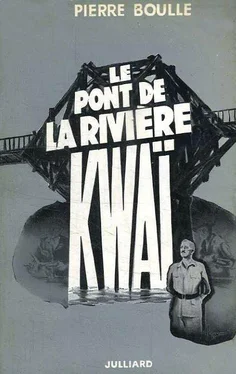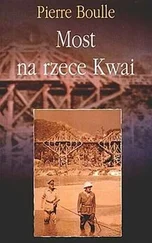“Number One,” he said.
Presently Shears and a couple of natives joined the group at the observation post.
“What’s the latest?” he anxiously asked as soon as he caught sight of Warden.
“Everything under control. Nothing new. I’ve been here three days. It’s all set for tomorrow. The train leaves Bangkok sometime during the night and should get here about ten in the morning. What about you?”
“Everything’s ready,” said Shears, lowering himself to the ground with a sigh of relief.
He had been horribly afraid that the Japanese plans might have been changed at the last moment. Warden, too, had been on tenterhooks since the evening before. He knew that the bridge was being prepared that night and had spent hours listening blindly for the slightest sound from the River Kwai, thinking of his two friends at work in the water just below him, constantly weighing their chances of success, visualizing each successive stage of the operation, and trying to think of any snag that might possibly crop up. He had heard nothing unusual. According to the program, Shears was to rejoin him at daybreak. It was now past ten o’clock.
“I’m glad you’ve turned up at last. I was getting a little worried.”
“We were hard at it all night.”
Warden looked at him more closely and saw that he was utterly exhausted. His clothes, which were still damp, steamed in the sun. His drawn features, the dark circles under his eyes, the growth of beard on his chin, made him look like nothing on earth. Warden handed him a flask of brandy and noticed how he fumbled as he seized it. His hands were covered with scratches and cuts, the dead-white skin wrinkled and hanging in strips. He could hardly move his fingers. Warden gave him a dry shirt and a pair of shorts which he had put out for him, then waited.
“You’re quite sure nothing’s planned for today?” Shears repeated.
“Absolutely. Another signal came in this morning.”
Shears took a gulp, then gingerly started massaging his legs.
“Rather a tough job,” he remarked with a shudder. “I think I’ll remember that cold water for the rest of my life. But everything went off all right.”
“What about the youngster?”
“The youngster was terrific. Didn’t let up for a second. He was at it harder than I was, yet showed no sign of fatigue. He’s now in position on the right bank. He insisted on settling in at once and staying put until the train arrives.”
“Supposing they get wind of him?”
“He’s well concealed. It’s a risk, I know, but it’s worth it. We’ve got to avoid a lot of movement round the bridge at this stage. And then the train might turn up earlier than we think. I’m sure they won’t catch him napping today. He’s young, and he’s tough. He’s lying up in a thicket which can only be reached from the river, and the bank there is steep. We can probably see the place from here. All he can see, through a gap in the branches, is the bridge. But he’ll be able to hear the train approaching.”
“Did you go there yourself?”
“I went with him. He was right. It’s a perfect position.”
Shears took out his field glasses and tried to spot the place in a landscape which was strange to him.
“It’s hard to pin-point it,” he said. “It all looks so different from here. But I think it’s over there, about ten yards behind that large red tree with its branches trailing in the water.”
“So now everything depends on him.”
“Yes, everything depends on him, and I feel completely confident.”
“Has he got his knife?”
“He’s got his knife. And I’m sure he’ll be capable of using it.”
“One can never really tell till the time comes.”
“I know one can’t. All the same, I’m pretty sure.”
“And afterwards?”
“It took me five minutes to get across the river, but he swims nearly twice as fast as I do. We’ll be able to cover his withdrawal.”
Warden told Shears what arrangements he had made. The evening before, he had climbed down from the observation post, this time before it was quite dark, but had not gone as far as the stretch of flat, open ground. On his way he had selected a suitable spot for the team’s light machine gun and had reconnoitered positions for the partisans, who were to provide rifle fire in the event of a counterattack. Each position had been carefully noted down. This barrage, in conjunction with the mortar shells, would provide ample protection for quite a long time.
Number One approved of the plan in general. Then, since he felt too tired to sleep, he described to his friend how the previous night’s operation had been carried out. As he listened carefully to this account, Warden felt almost relieved that he himself had not taken part in the preparations. Meanwhile, there was nothing else for them to do until the next day. As they had said, everything now depended on Joyce—on Joyce and the fortunes of war. They tried hard to curb their impatience and to stop worrying about the principal actor, who now lay hidden in the bushes over on the enemy bank.
As soon as he had decided to put his plan into action, Number One had drawn up a detailed program. He had assigned the various roles so as to enable each individual member of the team to think out in advance what he would have to do and to rehearse each move that he would have to make. In this way, when the time came, they would all be able to keep their minds free to deal with any unforeseen eventuality.
It would be childish to think that a bridge can be blown up without a great many preparations. Working from Joyce’s sketch and notes, Warden, like Captain Reeves, had made a plan—a destruction plan: a large- scale drawing of the bridge in which every pile was numbered and every charge marked in at the exact spot where it would be needed, the intricate network of electric wire and detonating cord which would set the whole thing off being indicated in red pencil. Each of them soon had this plan engraved on his memory.
But these paper-work preparations had not been sufficient for Number One. He had made them go through several rehearsals at night on an old derelict bridge lying across a stream not far from their camp, the charges, of course, being represented by sacks of earth. The men who were to fix the explosives in position—himself, Joyce, and two local volunteers—had practiced swimming silently, pushing in front of them a light bamboo raft specially built for the purpose, on which all the kit was fastened. Warden was the umpire. He had been quite ruthless, and had made them repeat the drill until the operation was a hundred per cent perfect. The four men had gotten used to working in the water without making a splash, fastening the dummy charges firmly onto the piles, and connecting them together by means of the intricate network of fuses worked out in the destruction plan. At last they had managed to do it to Number One’s satisfaction. All that now remained was to prepare the genuine material and see to a mass of important details, such as waterproof sheeting for whatever needed protection from the damp.
The party had then started off. Along paths known only to themselves, the guides had taken them to a point on the river a long way upstream from the bridge, where the launching could take place in complete security. Several native volunteers were acting as porters.
The plastic was made up into twelve-pound charges, each of which had to be fastened to a separate pile. The destruction plan called for the preparation of six consecutive piles in each row, making a total of twenty-four charges. All the supporting beams would thus be shattered for a stretch of nearly thirty yards, which would be quite sufficient to bring the bridge down under the weight of a train. Shears had wisely brought a dozen extra charges in case of accident. They might eventually be fixed in some suitable position to cause the enemy further alarm. He was not one to forget the maxims of Force 316.
Читать дальше











